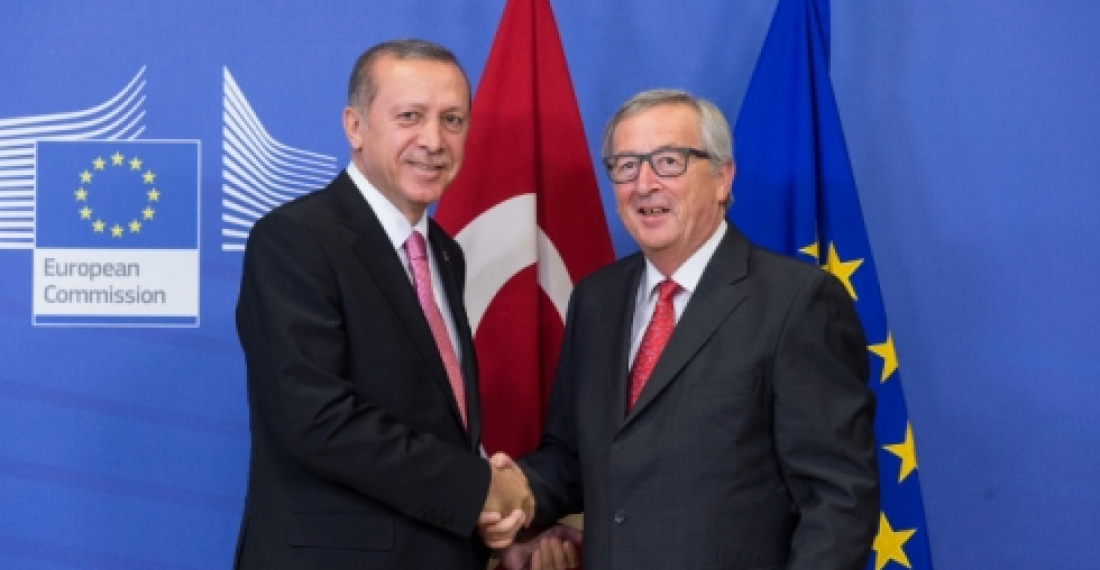The visit of Turkish President Recip Tayip Erdogan to the European institutions in Brussels this week could not have come at a more crucial time for the two sides.
For the European Union, faced by the challenge of the arrival of hundreds of thousands of refugees from Syria and beyond, Turkey is an indispensable element for managing the flow whilst alleviating the massive human suffering that the Syrian crisis has created. For Turkey, the burden of looking after millions of Syrian refugees - something which the country has done with great generosity and with little outside assistance for many years already - is starting to have economic and social consequences.
The decision of the European Union to recognise the importance of the Turkish role in addressing the current refugee crisis in Europe is long overdue, but better late than never. As President Juncker said in the European Parliament on Monday (6 October) "The EU stands ready to further step up help for Turkey to improve reception facilities for refugees and improve their wellbeing. In the refugee crisis, Turkey and the EU walk together and work together."
One may feel some sympathy for President who two days later, speaking to journalists accompanying him during his trip to Japan, said the refugee influx caused by the continuing Syrian crisis had once again highlighted Turkey's crucial importance to Europe and that EU leaders had been reminded of this fact.
The refugee crisis topped the agenda during meetings with European Parliament President Martin Schultz, European Council President Donald Tusk and European Commission President Jean-Claude Juncker. Schultz, Tusk and Juncker seemed more eager to cooperate than before, said the president, adding: "They all admit the burden Turkey is shouldering, especially concerning the refugees. They agree that the EU needs to share the weight, which they will resolve after deliberations among themselves." With Turkey sheltering 2 million Syrians and Iraqis, 400,000 of whom are in Istanbul alone, it would be encouraging if Europe continued to remain as sensitive to their plight as now, he said.
Erdogan expressed his optimism over the improvement in Turkey's relations with the EU. "My meetings with Schultz, Tusk and Juncker, who are the most senior EU officials, were very positive", he told journalists.
A testing time for Turkey too.
For Turkey however, this has been a testing week as well - one in which it also got a sense as to who are its real friends. Incidents involving Russian military planes on the Turkish border with Syria have exposed how fragile Russian-Turkish relations are, and how important Turkey's relations with NATO continue to be. President Erdogan has not minced his words in expressing his disappointment at Russia's actions saying that Russian infringements of Turkey's airspace in the past few days were incompatible with the close links the two countries have and added that the Russian administration was close to losing Turkey as a friend. He noted that the NATO Council had held an emergency session and released a tough statement condemning Russian actions. "It said violating Turkish airspace meant violating NATO airspace. I must admit that Russian statements about these violations cannot be deemed as serious. Russia perpetrating such acts with a neighbouring country with which it has a high-level cooperation council is unbecoming. "He said he had met with Russian President Vladimir Putin late last month and also spoke to him after Russia began its air strikes in Syria. "Violations of our airspace after all that do not correspond to serious statesmanship. We are definitely upset. It should not have happened."
When asked if he would be talking to Putin to prevent the violations from deteriorating into clashes, Erdogan said: "I don't believe Russia would do such a thing. NATO's emergency meeting showed how seriously they took the matter." He said the violations occurred after he talked with Putin, and he did not believe it meaningful to call Putin again under such circumstances.
It is in time of need that friendships are tested, and for the European Union as for Turkey these are testing times. Both sides have in the past squandered opportunities to put their relations on a more solid basis. From the current crises a new solidarity between Turkey and the EU may emerge. Both sides are now approaching the relationship from a more pragmatic and less emotional position. The current crises open new opportunities and it falls on all concerned to make sure that this time they get it right.
source: This commentary was prepared by the editorial team of commonspace.eu with additional reporting from the Press Service of the European Commission, Daily Sabah (Turkey) and agencies.
photo: President Erdogan of Turkey and European Commission President Junker in Brussels on 5 October 2015. (Picture courtesy of the Press Service of the European Commission.







